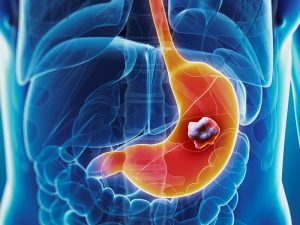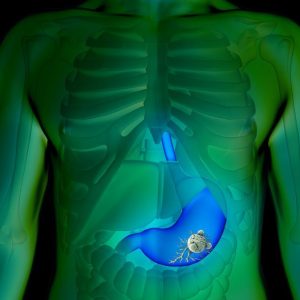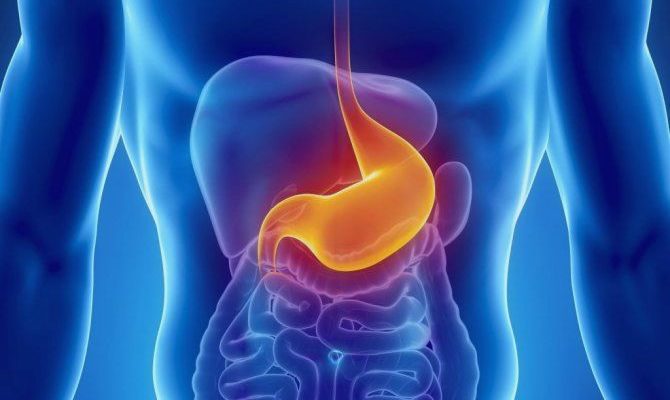The development of a malignant tumor of the stomach is preceded by precancerous conditions – chronic diseases that can be detected and treated. These are usually gastritis, ulcers and polyps.
Stomach cancer is a malignant tumor growing from the epithelial cells of the mucous (inner) lining of the stomach. The tumor can occur in different parts of the stomach: in the upper, where it connects to the esophagus, in the main part (body) of the stomach, or in the lower, where the stomach connects to the intestines.
The likelihood of developing stomach cancer increases in both men and women after 50 years, but in the stronger sex the risk of developing a tumor is twice as high. As for the geographical spread of stomach cancer, in Russia the disease ranks second in terms of frequency of occurrence among malignant tumors. There are 36 sick people per one hundred thousand healthy people. The situation is worse only in Japan (75 patients), as well as Scandinavia, Chile, Brazil and Colombia (40-50 patients).
But there is good news as well. According to medical statistics, over the past thirty years there has been a slow but steady decline in the incidence of stomach cancer. It is especially worth rejoicing for the Americans, who have stomach cancer today is surprisingly rare (5 cases per 100,000 population).
Causes of stomach cancer
It is known that a normal cell is transformed into a cancer cell if a certain mutation (defect) occurs in its chromosomes. But what exactly causes this mutation in stomach cancer? Despite all the advances in medicine in the study of cancer, the cause of malignant degeneration of stomach cells still remains unclear. At the moment, only a group of risk factors has been identified, which, under an unfavorable set of circumstances, can provoke this serious disease.
Risk factors for stomach cancer:
hereditary predisposition – if someone in the family has stomach cancer, then all other close (blood) relatives are more likely to get sick by 20%;
dietary habits – excessive enthusiasm for smoked, spicy, salty, fried (overcooked) and canned foods, long-term stored foods containing nitrates, significantly increases the likelihood of stomach cancer;
long-term diseases of the stomach: gastritis (with low acidity), [ulcers) (https://medportal.ru/enc/gastroenterology/ulcer/2/) and stomach polyps;
stomach surgery increases the risk of stomach cancer by 2.5 times;
the presence in the stomach of [Helicobacter Pylori [(https://medportal.ru/clinics/services/143/): in 1994, the World Health Organization (WHO) recognized the link between Helicobacter Pylori and stomach cancer and put this bacterium in the category of first class carcinogens ;
work with asbestos and nickel;
deficiency of vitamins B12 and C;
primary and secondary (eg AIDS) immunodeficiency states;
20 times more often stomach cancer occurs in patients with pernicious (malignant) anemia;
some viruses, in particular, the Epstein-Barr virus;
alcoholism and smoking.
What’s happening?
It has now been proven that cancer practically does not occur in an absolutely healthy stomach. It is preceded by a so-called precancerous condition: a change in the properties of the cells lining the stomach. The most common causes of gastric precancer are chronic gastritis with low acidity, ulcers and polyps in the stomach.
On average, it takes 10 to 20 years from precancer to cancer. At the initial stage of cancer, a small tumor less than 2 cm in size appears in the stomach. Gradually, it grows inward (all layers of the stomach wall grows) and in breadth (spreads over the surface of the stomach). A tumor in the stomach can interfere with digestion. If it is located on the border with the duodenum (in the area of the gatekeeper), it will prevent the passage of food into the intestines. Located near the esophagus, it will interfere with the entry of food into the stomach. As a result, a person begins to lose weight dramatically. Germinating the wall of the stomach, the tumor spreads to other organs: the colon and pancreas.
Stomach cancer symptoms
A small tumor is most often asymptomatic. In only a few cases, stomach cancer patients may experience the following symptoms:
decreased appetite;
changes in eating habits: for example, they feel aversion to meat, fish, etc.;
an increase in temperature (usually 37-38 degrees);
anemia (decreased hemoglobin).
As the cancer of the stomach grows, new symptoms appear:
feeling of heaviness in the abdomen after eating, nausea and vomiting, fast satiety;
violation of the stool (diarrhea, constipation);
pain in the upper abdomen, girdle pain radiating to the back (when the tumor spreads to the pancreas);
an increase in the size of the abdomen, accumulation of fluid in the abdominal cavity (ascites);
losing weight;
if the tumor destroys the vessels, the development of gastrointestinal bleeding is possible (the symptoms of such bleeding include black liquid feces or the presence of dark blood in the vomit).
Metastasis of gastric cancer
Stomach cancer is characterized by a tendency to the early appearance of a large number of metastases: some cancer cells separate from the original tumor and spread throughout the body (for example, along with the flow of blood and lymph), forming new tumor nodes (metastases). In stomach cancer, metastases most often affect the lymph nodes and liver. In addition, the ovaries, the space near the rectum, the peritoneum, the navel, bones, lungs, the area above the left clavicle, etc. may be affected. The appearance of such metastases indicates very late stages of the disease, when treatment is ineffective and is only intended to improve the patient’s quality of life.
Stomach cancer types
Different types of stomach cancer are distinguished depending on the degree of differentiation of tumor cells, on the localization of the tumor in the stomach and on how the tumor grows.
The most common adenocarcinoma of the stomach (the tumor is formed by the glandular cells of the mucous membrane). Just like squamous cell carcinoma of the stomach, these are moderately differentiated tumors.
Signet ring cell carcinoma of the stomach is characterized by diffuse growth, characterized by rapid development and early metastasis, and women predominate among the diseased.
In infiltrative stomach cancer, the tumor has no clear boundaries, growth is directed into the thickness of the stomach wall; occurs at a young age, often metastasizes.
Poorly differentiated stomach cancer is characterized by rapid growth, inflammation and necrosis around the tumor; cancer cells develop in the thickness of the stomach wall. Regional lymph nodes and distant organs are quickly involved in the process.
Stages of stomach cancer
There are 4 clinical stages of cancer.
1st stage
The tumor is small (up to 2 cm), occupies the mucous and submucous layer of the stomach wall, regional lymph nodes are not affected or isolated, there are no distant metastases. Stage 1 also includes a deeper lesion of the layers of the intestinal wall (up to muscle and sub-serous), but in the absence of damage to the lymph nodes and distant organs.
Stage 2
A tumor of a larger size or grows deeper into the wall of the stomach, or affects a larger number of regional nodes (up to 15), while there are no distant metastases.
Stage 3
Complete germination of the entire stomach wall occurs, more distant lymph nodes are affected, but there are no metastases to distant organs. It is also possible that the tumor grows to neighboring organs, but without affecting the lymph nodes.
Stage 4
It is characterized by the spread of the tumor to neighboring organs or the presence of at least one metastasis to distant organs.
Stomach cancer treatment
The success of gastric cancer treatment directly depends on the size and extent of the tumor to adjacent organs and tissues, as well as on metastasis. Very often, a diagnostic laparoscopy is performed before the operation in order to exclude metastases in the peritoneum.
At an early stage of the disease, in some cases, an endoscopic operation to remove the tumor can be performed.
The main method of treating stomach cancer is surgical, which consists in removing the tumor along with the stomach (gastrectomy) or part of it. If radical surgery is not possible, preoperative radiation or chemotherapy can be performed to reduce the size and growth of the tumor.
Surgeries for stomach cancer are very extensive and traumatic, as a rule, they require preoperative preparation to stabilize the patient’s condition.
In some cases, in addition to the stomach, the spleen, part of the liver https://en.wikipedia.org/wiki/Liver or intestines are removed. After surgery, chemotherapy or radiation therapy may be prescribed.
Chemotherapy is given in courses (usually 2 or 3), while several drugs are prescribed in various combinations.
If surgery is not possible, then in some cases palliative chemotherapy is prescribed to prolong the patient’s life.
Prevention of stomach cancer
Prevention of stomach cancer consists in annual gastroscopy for those people who have atrophic gastritis, stomach ulcers, stomach polyps, as well as people who have relatives suffering from stomach cancer.
